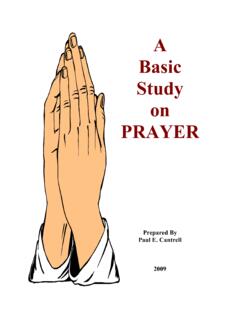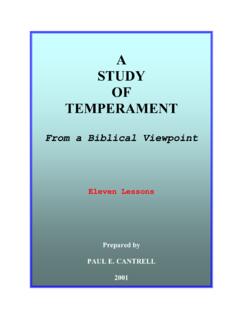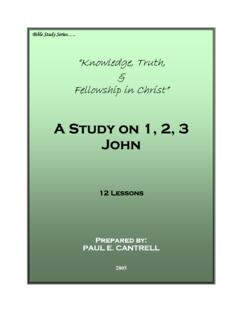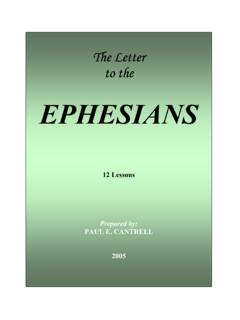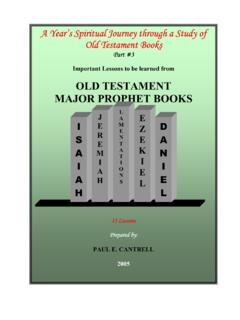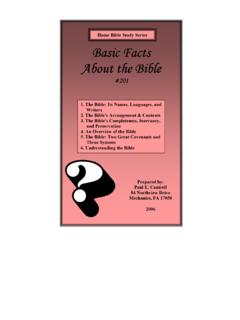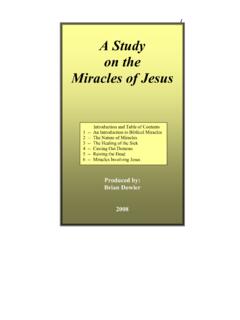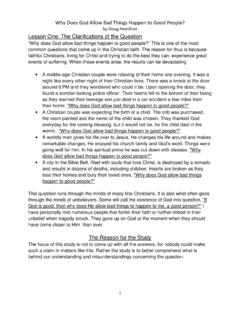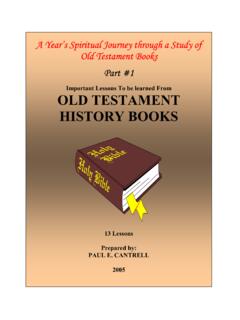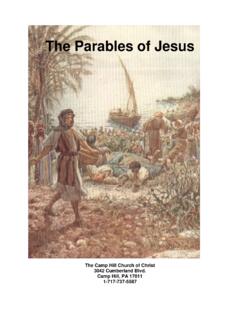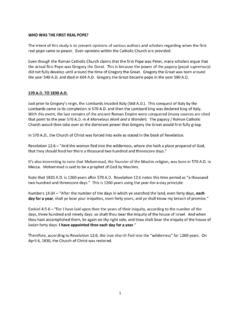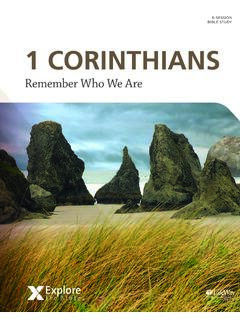Transcription of JAMES. the Study of - Camp Hill church
1 Bible Study Series The Study ofThe Study ofThe Study ofThe Study of JAMES Practical christianity Practical christianity Practical christianity Practical christianity 12 Lessons Prepared by: PAUL E. CANTRELL 2006 The Study ofThe Study ofThe Study ofThe Study of JAMES Practical christianity Practical christianity Practical christianity Practical christianity 12 Lessons Prepared by: PAUL E. CANTRELL 84 Northview Drive Mechanicsburg, PA 17050 2006 Table of Contents A Study of the Book of James LESSONS TOPICS PAGE 1 -- Introduction to the Book of James (1:1) 1-5 2 -- Attitudes Toward Mistreatment (1:2-4; 5:1-12) 6-8 3 -- Perfecting Faith (1:5-8; 2:14-26) 9-11 4 -- The Sin of Showing Preference (1:9-11; 2:1-13) 12-14 5 -- The Pathway of Sin (1:12-16) 15-16 6 -- Gifts from God (1:17; 4:13-17; 5:13-20) 17-19 7 -- Wisdom and God s Word (1:5; 1:18; 3:13-18) 20-22 8 -- The Swiftness to Hear (1:19-21) 23-25 9 -- Laying Aside Evil (1:21; 4:1-10) 26-27 10-- Doers of the Word (1:22-25) 28-30 11-- The Need to Bridle our Tongue (1:26.)
2 3:1-12) 31-33 12-- Pure and Undefiled Religion (1:27) 34-36 The Study of James Page 1 Lesson One Introduction to the Book of James (James 1:1) The book of James has been variously evaluated by men. The three following quotes will give you some ideas of what others think about the book: There is no more Jewish book in the New Testament than the Epistle of James, not even including Matthew, Hebrews, and the Revelation letter. If we eliminate two or three passages containing references to Christ, the whole epistle might find its place just as properly in the Canon of the Old Testament as in that of the New Testament, as far as its substance of doctrine and contents is concerned. That could not be said of any other book in the New Testament. Saint James Epistle is a right strawy Epistle as compared with them (John s letters, Paul s, and Peter s); for it has no real Gospel character. Why are such statements made about this book and are they justified?
3 It is because of such statements like the above that caused the book to be questioned as to whether it should be placed in the New Testament Canon. After some discussion and some years passed, the book was included in the New Testament Canon. There were some early references to the book as noted below: 1. Origen (c. 230 AD) He was the first to explicitly quote James as Scripture. 2. Shepherd of Hermas (100-150 AD) The write seems to echo some of its teachings. 3. Clement of Rome (c. 96 AD) He uses similar language as that of James. 4. 1st Peter (c. 65-67 AD) There are similarities of language in the two books. If the book of James was written early, it would possibly reflect the religious conditions between Jews and Christians. In some instances, there was very close identity until persecution began to divide the two groups from each other. The early Christians only had the teaching of Christ as the Messiah and the barest rudiments of christianity .
4 They often met together as in Acts 4 in the Temple also in Synagogues, as well as their homes (Acts 9:1-2). Those who were persecuted were scattered, but they preached Christ but to Jews only at first. As late as AD 58 some Jewish believers were still zealous of the Law (Acts 21:20). The Jews had been scattered among the nations many years before the beginning of the church . The book of Acts reveals that there were Synagogues in most major cities of the civilized world (Acts 2:5; 8:4; 11:19-21). But one of the more obvious facts about the comparison between Judaism and christianity is that both had moral laws by which God s people were to be guided. The Old was in reality a shadow of the it is to be expected that there would be many similiarities. So the book of James would generally fit well in the Old Testament Canon as well as the New Testament Canon. There has been universal acceptance of this book in the Canon of the New Testament.
5 The Study of James Page 2 THE WRITER OF THE BOOK The writer is stated as being: James, a bondservant of God and of the Lord Jesus Christ. (1:1). However, there is more than one James in the New Testament. There was James, the brother of John, an Apostle (Matthew 10:2); James, the son of Alphaeus, also an Apostle (Matthew 10:3; Mark 15:40); and James, the Lord s brother (Matthew 13:54-56). Which James would possibly be the writer of this book? James, the brother of John, was beheaded early (Acts 12). James, the Less (son of Alphaeus) was not prominent in the early church and we do not know much about him. The writer does not identify himself further; and it could be assumed that he was someone well-known and did not need further identification at the time. Some have felt that there is some similarity in the book of James with the remarks of James, the Lord s brother, as recorded in Acts 15 and Acts 21. Thus, the weight of what evidence we have seems to point to the Lord s brother.
6 THE LIFE OF JAMES, THE LORD S BROTHER James was one of four other brothers of Jesus (James, Joses, Simon, and Judas Matt 13:54-56). If all four of these were born of Josephus and Mary, James would probably be the oldest since he is mentioned first in the listing. They would have all been born and brought up in Nazareth (Matt. 2:22-23). Joseph, being a just man, would have brought his children up in the strict observance of the Law of Moses. We know nothing about James up till the time of Jesus public ministry. The indications are given in John s Gospel that his brothers did not really believe Him to be the Messiah (John 7:5). At Jesus death, He committed His mother to the care of the Apostle John, not His brothers (John 19:26-27). But after Jesus death and resurrection, He appeared to a James in particular (presumed to be His brother 1 Cor. 15:7). All of Jesus brothers and mother were to with the disciples and Apostles in Jerusalem (Acts 1:14).
7 For a while no mention is made of James until Paul s letter to the Galatian churches (Gal. 1:15-19 AD 39). After the early death of James, the brother of John, and Peter s release from prison (Acts 12:1-17 AD 44), Peter tells the brethren at John Mark s house to tell James of his release. From this time on James seems to have taken a very prominent role in the church at Jerusalem (AD 50-62). He was one of the elders in Jerusalem highly respected almost on the level of an Apostle (Gal. 1:17-20). In the Jerusalem discussion over the question of Gentiles being circumcised and keeping the Law (AD 50 Acts 15), James gave the concluding thoughts and wrote the letter that was to be carried to the Gentile Christians. James endorses Paul s work among the Gentiles, but was himself mainly concerned with the Jews believing in Jesus (Gal. 2:11-12). He felt that the Jewish Christians should keep the Law, but not the Gentiles which caused problems at Antioch.
8 His intense interest in winning Jews to Christ is shown by his advise to the Apostle Paul (Acts 21:17-26). The writer of this letter is referred to as James, the Just, because of his devotion to God. He drank no wine, ate no animal food, and no razor touched his head. He spent much time in prayer at the Temple and had a strong emphasis upon obedience to God. His death as a martyr came in AD 62, as recorded by Josephus, the Historian. His remarks were mentioned by Hegesippus (a Christian Jew in 160 AD) and later by Eusebius, another Historian. The Study of James Page 3 Upon the death of Festus and before the new ruler came, the High Priest and Scribes and Pharisees compelled James to proclaim from one of the galleries of the Temple that Jesus was not the Messiah to restrain the people who were embracing christianity in large numbers. Instead he cried the opposite, whereupon his enraged enemies hurled him to the ground, then stoned him, till he was dead.
9 Shortly afterwards, the fatal siege of Jerusalem began many of the Jews feeling that this was their punishment for murdering James. TO WHOM THE BOOK WAS WRITTEN The writer states that he is writing to: the twelve tribes which are scattered abroad. (1:1). This phrase could apply to Jews who had been scattered throughout the civilized world or to Jewish Christians everywhere. The later we believe is the obvious from the following information: 1. Abraham was spoken of as being our father (2:21). 2. The Synagogue was spoken of as a place of worship (2:2). 3. Yet, he speaks of himself as being a servant of the Lord Jesus Christ (1:1). 4. He also shared with them a common faith in the Lord Jesus Christ (2:1). 5. Those to whom he wrote had been begotten by the Will of God, which is a New Testament concept (1:18). 6. He said that the rich blaspheme the worthy name by which you are called (2:7). 7. He exhorted them to wait patiently for the coming of the Lord (5:7).
10 8. He encouraged them to look for a crown of life (1:12). 9. He seems to be using the phrase twelve tribes in a spiritual sense as those with whom God was pleased. The date of the writing of this letter is not exact, but there are some indications as to possibilities. It probably was not written any earlier than AD 45, nor later than AD 62 (when he died a martyr s death. The Jewish tone of the book with no Gentiles involved could denote an early date. There is no reference made to the controversy over Gentiles being circumcised and keeping the Law of Moses (AD 50). The use of the word Synagogue for a place of worship may indicate an early date also. And also, the absence of drawn-out arguments against Judaizing christianity could be a very good indication of an early date. The time could be as early as AD 45-48. POSSIBLE CONDITIONS THAT CAUSED THE BOOK TO BE WRITTEN The following passages could be indicators that caused James to write to the Jewish Christians that had been scattered abroad: 1.)
